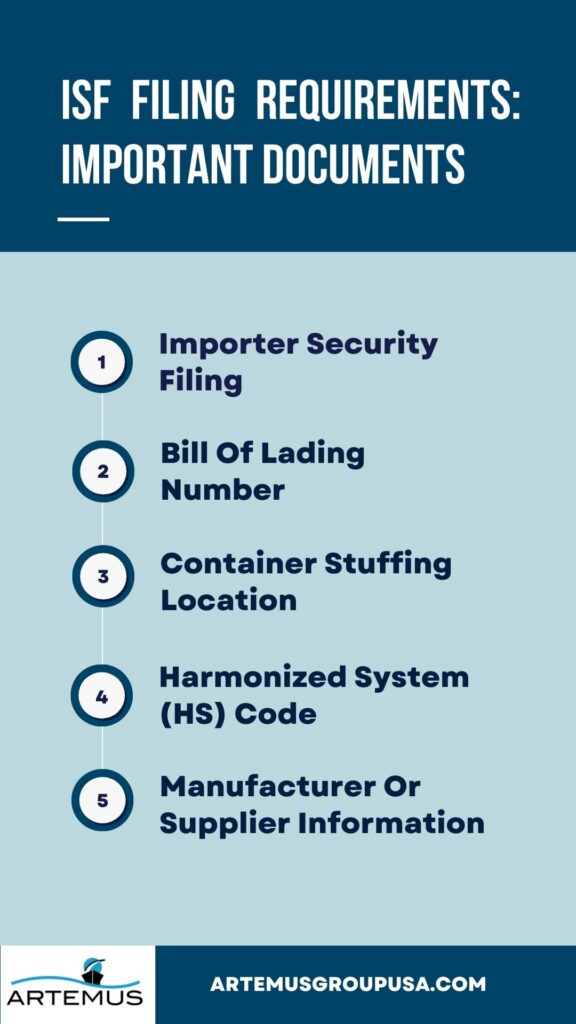
What Is Inbound Logistics & Outbound Logistics? A 2025 Guide
In the dynamic world of supply chain management, understanding the nuances of inbound and outbound logistics is crucial for operational

In today’s global trade environment, ensuring compliance with customs regulations is crucial for smooth import operations. One such requirement is the Importer Security Filing (ISF), also known as “10+2,” mandated by U.S. Customs & Border Protection (CBP).
This filing demands detailed information about your cargo before it reaches U.S. shores, aimed at enhancing security and efficiency. Navigating ISF requirements can be complex, but with the right tools and support, it becomes manageable.
At Artemus Transportation Solutions, we specialize in streamlining the ISF process with our cutting-edge ISF & AMS software solutions. These are designed to simplify compliance and enhance efficiency, allowing you to focus on what matters most—your business.
Explore the solutions to make your ISF filing experience seamless and hassle-free.
Table Of Contents
Importing goods into the United States involves several regulatory requirements, and one crucial element is the Importer Security Filing (ISF). Understanding when and how to file an ISF is essential for compliance and avoiding potential penalties. Here’s a breakdown of when ISF filing is required:
The ISF requires detailed information about the shipment, including:
Failure to comply with ISF requirements can result in significant penalties. CBP may impose fines, delays in cargo release, and increased scrutiny for future shipments. Ensuring timely and accurate ISF filings is crucial to avoiding these consequences.
To streamline the ISF filing process and ensure compliance, consider using specialized software solutions. Artemus Transportation Solutions offers advanced ISF & AMS software designed to simplify and automate the filing process, reducing the risk of errors and ensuring timely submissions
Related: A Quick Guide On Import Security Filing: What Is ISF?
The responsibility for filing the Importer Security Filing (ISF) lies with the importer of record, who is the owner, purchaser, consignee, or agent of the goods being imported into the United States. As the party with the most knowledge and control over the shipment, the importer is responsible for providing accurate and timely information to U.S. Customs and Border Protection (CBP) through the ISF filing.
However, importers can delegate the task of filing the ISF to a licensed customs broker or an authorized agent. Customs brokers are experienced professionals who specialize in customs regulations and can handle the ISF filing process on behalf of the importer.
It is essential for importers to collaborate closely with their chosen customs broker or agent to ensure that all required information is provided accurately and within the specified timelines to meet ISF filing requirements.
Related: Late ISF Filing: What To Do If Missed The Deadline?
To ensure compliance and facilitate a smooth importation, it’s essential to understand the key aspects of ISF filing. Here are some relevant pointers to help you know everything about ISF filing requirements:
ISF filing requires the submission of specific information about imported goods. This includes details such as the seller and buyer information, manufacturer information, container stuffing location, vessel stow plan, and more. Familiarize yourself with the required data elements to ensure accurate and complete filing.
Timely submission of the ISF is crucial. The ISF must be filed no later than 24 hours before the cargo is loaded onto the vessel. Failure to comply with the filing deadline can lead to penalties imposed by U.S. Customs and Border Protection (CBP). Understanding the timelines and potential penalties is vital to avoid disruptions in the import process.
ISF filing can be done using authorized methods, including through a licensed customs broker, an authorized agent, or through a self-filing option. Consider the most suitable method for your business needs and ensure that the chosen entity or individual is knowledgeable about ISF requirements.
It’s important to be aware of situations that may require amendments to the initially filed ISF. Changes to the information, such as the shipping schedule, consignee details, or container information, may necessitate filing amendments. Understanding the procedures for amending an ISF and communicating any changes promptly with the CBP can help maintain compliance
The CBP conducts audits and compliance checks to ensure adherence to ISF requirements. Random audits and targeted reviews may be carried out, and it is essential to have proper internal compliance programs in place. Self-auditing, regular internal reviews, and collaboration with customs brokers can help minimize compliance risks.
ISF filing requirements may undergo updates and changes over time. To stay informed and up-to-date, it’s essential to monitor official communications from the CBP, review regulatory changes, and be aware of industry trends. Being proactive and adapting to changes in ISF filing requirements can help ensure smooth import operations.
Related: ISF Fees (Import Security Filing): When & How To Pay?
The ISF (Importer Security Filing) filing requirements in the USA pertaining to the submission of specific information about ocean shipments entering the country. Importers or their authorized agents are responsible for complying with these requirements. The key filing details include:

The ISF must be submitted at least 24 hours before the cargo is loaded onto the vessel at the foreign port. This filing includes information about the importer of record, consignee, seller, buyer, and other essential parties involved in the transaction.
The unique identifier for the shipment, known as the Bill of Lading (B/L) number, must be provided in the ISF filing. This number is crucial for tracking and identifying the cargo throughout its journey.
The ISF requires the name and address of the location where the cargo is being stuffed into the container. This information helps authorities assess potential security risks associated with the shipment.
The HS code, which classifies the goods based on their nature and purpose, must be included in the ISF. This code helps customs officials determine the appropriate duties, tariffs, and regulations applicable to imported goods.
The ISF filing also requires details about the manufacturer or supplier of the goods, including their name and address. This information aids in verifying the legitimacy and origin of the imported items.
Related: ISF 5: Meaning, Compliance Requirements, & Best Practices
Accurate and timely filing of the Importer Security Filing (ISF), also known as 10+2, is crucial for ensuring compliance with U.S. Customs and Border Protection (CBP) regulations and facilitating a smooth import process. To help importers meet their ISF filing requirements efficiently, here are some best practices to consider:
Related: ISF 5 Filing Requirements: Data Elements & Audit Process
The Importer Security Filing (ISF), also known as 10+2, requires importers to provide specific information about their shipments before they are loaded onto vessels bound for the United States. While the initial ISF filing is crucial, it’s important to be aware that amendments may be necessary in certain circumstances. Here is an overview of ISF amendments and some of the latest updates:
1. Circumstances Requiring Amendments: Amendments to the initially filed ISF may be required due to changes in shipment details. Some common scenarios that may necessitate amendments include modifications to the shipping schedule, changes in consignee information, alterations to the container or vessel information, or adjustments to the bill of lading number.
It is important to monitor the progress of your shipment and promptly communicate any changes that require an amendment to the ISF.
2. Procedures For Amending An ISF: To make amendments to an ISF, importers must follow specific procedures. The amendment process typically involves submitting an updated ISF filing containing the revised information through the authorized filing method used for the original filing.
It is essential to ensure that the amendment is filed within the required time frame, typically before the arrival of the vessel at the U.S. port. Failure to file timely amendments may result in penalties or delays in cargo clearance.
3. Impact Of Amendments On Compliance: Making timely amendments is crucial to comply with CBP regulations and avoid potential penalties. If amendments are not made or if incorrect information is submitted, CBP can impose fines of up to $5,000 per violation.
These penalties can be assessed for various infractions, including late filings, failure to file, or inaccuracies in the data provided.
4. Communication With Customs Authorities: Maintaining open lines of communication with U.S. Customs and Border Protection (CBP) is crucial when filing ISF amendments. In case of any changes or amendments, it is recommended to notify CBP promptly.
Timely communication can help ensure that the amended ISF is properly processed, minimize disruptions in cargo clearance, and maintain compliance with CBP regulations.
Related: ISF Filing: A Compliance-Related Guide & Software Solution
Artemus Transportation Solutions offers cutting-edge ISF filing software designed to streamline the compliance process for importers. The advanced software simplifies the complex requirements of Importer Security Filing (ISF), ensuring that your filings are accurate and submitted on time.
With intuitive features and automated processes, Artemus’ ISF software minimizes the risk of errors and helps you meet U.S. Customs and Border Protection regulations effortlessly.
By choosing Artemus, you gain access to a robust solution that enhances efficiency and ensures seamless compliance with ISF requirements. The software not only saves you time but also provides peace of mind, allowing you to focus on your core business activities while we handle the intricacies of ISF filings.
Related: ISF Form (Import Security Filling): Elements & Top Practices
An Importer Security Filing (ISF) must be filed at least 24 hours before the cargo is loaded onto a vessel bound for the U.S.
The 10 data elements required for an Importer Security Filing (ISF) typically include the importer of record number, consignee number, buyer, seller, ship-to party, manufacturer or supplier, country of origin, harmonized tariff schedule (HTS) number, vessel name, and the port of unloading.
The importer or their authorized agent is responsible for filing the Importer Security Filing (ISF) with U.S. Customs and Border Protection.
Exemptions from ISF (Importer Security Filing) include shipments of cargo that are not arriving by sea, such as air freight, or those classified under certain exceptions like U.S. government shipments.

Understanding and complying with ISF (Importer Security Filing) requirements is crucial for importers seeking a smooth and efficient import process into the United States. The ISF filing program, implemented by U.S. Customs and Border Protection (CBP), plays a vital role in enhancing the security of maritime cargo by providing CBP with essential information before the cargo is loaded onto vessels.
Throughout this blog, we have explored various aspects of ISF filing requirements, including determining when ISF filing is necessary, best practices for accurate filing, amendments and updates, and the purpose of ISF filing. By following these guidelines and staying up-to-date with the latest regulations, importers can ensure compliance, minimize delays, and maintain the security of their cargo.
Related: ISF Form (Import Security Filling): Elements & Top Practices

In the dynamic world of supply chain management, understanding the nuances of inbound and outbound logistics is crucial for operational

In today’s interconnected world, businesses rely heavily on global trade to expand their markets, access new resources, and drive growth.

Importing goods for resale in the USA presents a lucrative business opportunity, but navigating the complexities of U.S. customs regulations,
Get In Touch
Artemus’ Software Solutions for ISF, AMS, Japan AFR, eManifest Canada, & Panama B2B filings.